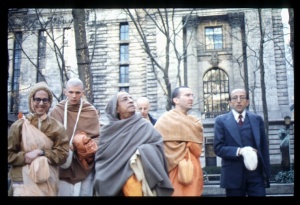CC Adi 10.56 (1975)

A.C. Bhaktivedanta Swami Prabhupada
Below is the 1996 edition text, ready to be substituted with the 1975 one using the compile form.
TEXT 56
- bhakte kṛpā karena prabhu e-tina svarūpe
- ‘sākṣāt,’ ‘āveśa’ āra ‘āvirbhāva’-rūpe
SYNONYMS
bhakte—unto devotees; kṛpā—mercy; karena—bestows; prabhu—Lord Caitanya; e—these; tina—three; svarūpe—features; sākṣāt—directly; āveśa—empowered by the Lord; āra—and; āvirbhāva—appearance; rūpe—in the features.
TRANSLATION
Lord Śrī Caitanya Mahāprabhu bestows His causeless mercy upon His devotees in three features: His own direct appearance [sākṣāt], His prowess within someone He empowers [āveśa], and His manifestation [āvirbhāva].
PURPORT
The sākṣāt feature of Śrī Caitanya Mahāprabhu is His personal presence. Āveśa refers to invested power, like that invested in Nakula Brahmacārī. Āvirbhāva is a manifestation of the Lord that appears even though He is personally not present. For example, Śrī Śacīmātā offered food at home to Śrī Caitanya Mahāprabhu although He was far away in Jagannātha Purī, and when she opened her eyes after offering the food, she saw that it had actually been eaten by Śrī Caitanya Mahāprabhu. Similarly, when Śrīvāsa Ṭhākura performed saṅkīrtana, everyone felt the presence of Śrī Caitanya Mahāprabhu, even in His absence. This is another example of āvirbhāva.